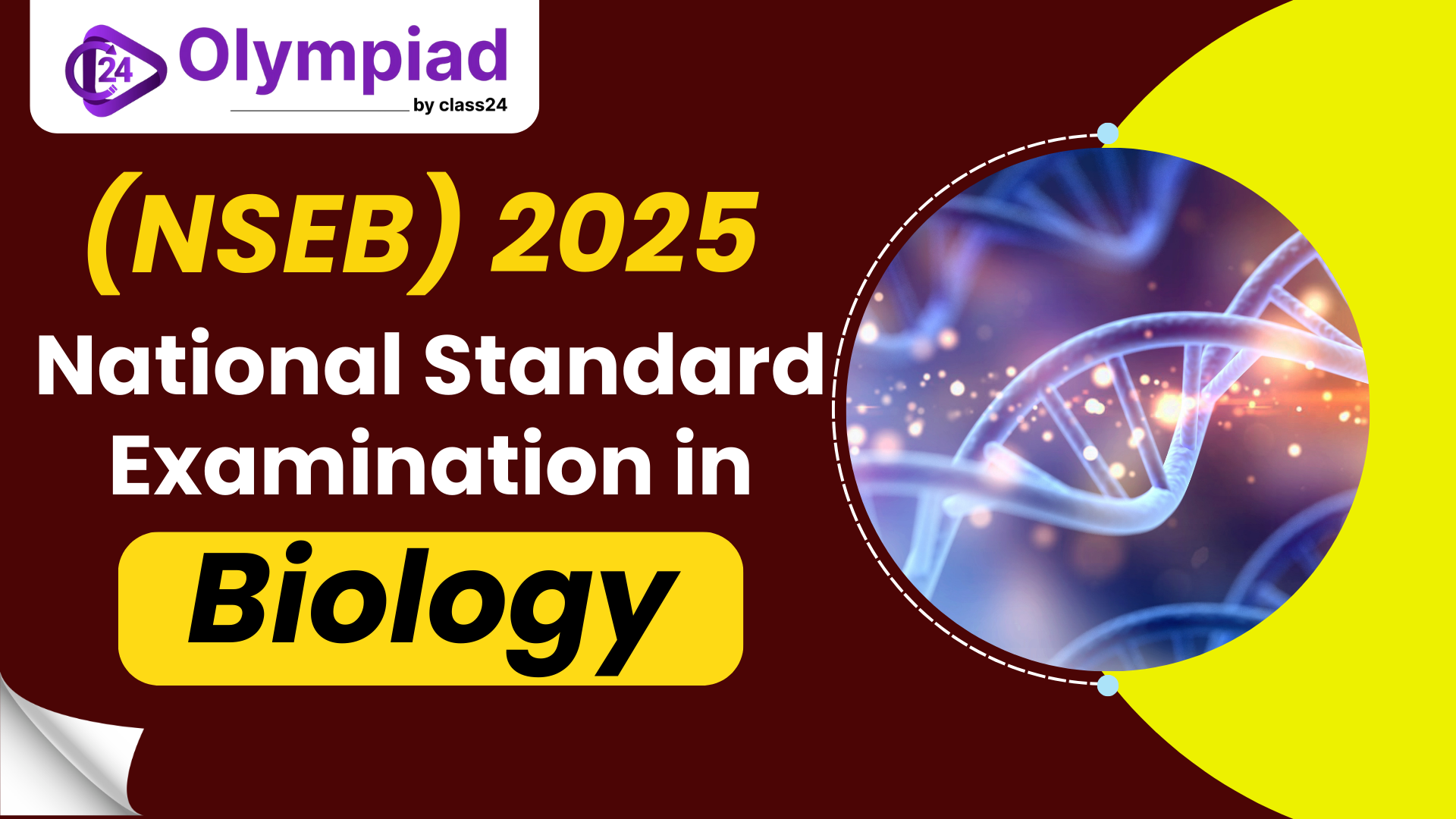
National Standard Examination in Biology Exam is India’s premier high school science biology examination, organized every year by the Indian Association of Physics Teachers (IAPT). To qualify for the International Biology Olympiad (IBO), a student must first pass the NSEB, which consists of five progressive rounds. It helps students build a strong foundation in biology and get ready to represent India on an international level. There are more than two lakh students who take part in NSEB Olympiad Exam each year, making it a tough and popular science Olympiad for Indian school students. You can register for the exam, which is usually held in November, from August through the IAPT website. iapt.org.in.
Being part of the National School of Excellence in Bullfighting leads to eligibility for extra training, scholarships, research, and awards at the university. It aids students who are interested in biology by giving them the skills they need for research, academics, or a job in biotechnology. The NSEB Olympiad 2025 helps to find and develop India’s most excellent biology students for international contests.
The syllabus for the National Standard Examination in Biology Exam is mainly created using the NCERT textbooks for Classes 11 and 12 as a reference. It is important for students to master the textbooks before moving on to reference books. Learning the key concepts in biology well allows students to work through typical NSEB questions that require critical thinking and application.
| Parameter | Details |
|---|---|
| Organization | IAPT (Indian Association of Physics Teachers) in collaboration with HBCSE (Homi Bhabha Centre for Science Education) |
| Exam Name | National Standard Examination in Biology (NSEB) 2025 |
| Registration Dates | August 2025 |
| Exam Date | 23 November, 2025 (tentatively) |
| Application Mode | Online |
| Types of Questions | Multiple Choice Questions (MCQs) - 60 questions |
| Total Marks | 216 |
| Negative Marking | Yes, one mark deducted for each wrong answer |
| Official Website | https://www.iapt.org.in/ |
It is important to keep track of important dates for NSEB Olym[iad Exam 2025 in order to register online for Biology Olympiad 2025 and get prepared on time. Items on the board remind students to create a study plan and sign up for the relevant exams in time. Students can register for NSEB 2025 from August to September, and the exam takes place in November. Results are usually declared in January of the next year, and the next stage of the Olympiad is in February.
| Event | Date |
|---|---|
| Registration Begins | August 2025 |
| Last Date to Apply | September 2025 |
| Exam Date | November 23, 2025 |
| Result Declaration | January 2026 |
| 2nd Stage (INBO) | February 2026 |
Only eligible participants are allowed to take the NSEB Exam 2025 and proceed through the Olympiad by the set rules. They help create a fair and equal way of making decisions. Here are the eligibility criteria for NSEB Olympiad 2025:
The IAPT manages all NSEB registrations, which can be done on their website. Both individual and group registrations are accepted, either by a student themselves or by a school or associated center. The registration period begins in August and ends on mid-September.
Here is the step-by-step guide for NSEB Online Registration 2025:
The application fee for NSEB Exam 2025 is made affordable so that students from different parts of India can participate. The method of registration can slightly influence how much the fees are. If the fee payment is made during the NSEB online registration, it confirms the candidate’s application.
| Mode of Registration | Fee Amount (Approx.) |
|---|---|
| Through School/Center | ₹200 |
| Individual | ₹250 – ₹300 |
Understanding how the Biology Olympiad Exam 2025 is organized is vital to doing well in any competition. This exam tests a student’s knowledge up to the senior secondary (Class XII) level through 60 multiple-choice questions. Knowing what to expect in the exam helps students plan their reviews accordingly. Here are the details of the exam pattern of NSEB Olympiad 2025.
| Section | Number of Questions | Type | Marks for Correct Answer | Negative Marking |
|---|---|---|---|---|
| Part A | 48 | Single correct option MCQs | +3 | -1 |
| Part B | 12 | Multiple correct options MCQs | +6 | 0 |
It includes both Class 11 and 12 Biology book PDFs that are in line with the guidelines from NCERT and CBSE. Students need to concentrate on central chemical concepts and keep practicing different problems regularly. The syllabus for the Biology Olympiad has been planned to help students face science-based challenges like competitions.
| S.No | Chapters | Important Topics |
|---|---|---|
| 1 | Diversity of Living | Plant Kingdom, Animal Kingdom, The Living World, Classification in Biology |
| 2 | Structural Organization in Animals and Plants | Morphology of Plants, Anatomy of Plants |
| 3 | Cell: Structure and Function | Cell Theory, Cell Division, Cell Cycle, Biomolecules |
| 4 | Plant Physiology | Growth and Development, Respiration, Transportation, Photosynthesis in Plants |
| 5 | Human Physiology | Neural and Chemical Coordination, Breathing, Digestion, Excretion, Circulation, Locomotion |
| 6 | Reproduction in Organisms | Types of Reproduction, Asexual and Sexual Reproduction, Fertilisation |
| 7 | Reproduction in Flowering Plants | Gametophytes, Flower Structure, Pollination, Fertilisation, Development of Gametophytes |
| 8 | Human Reproduction | Implantation, Placenta Formation, Menstrual Cycle, Gametogenesis, Male and Female Reproductive Systems |
| 9 | Reproductive Health | Reproductive Technologies, STI Prevention, Infertility, Contraception, Medical Termination of Pregnancy |
| 10 | Principles of Inheritance and Variation | Mendel’s Laws, Sex Determination, Genetic Disorders, Evolution, Similarities and Variations |
| 11 | Molecular Basis of Inheritance | DNA/RNA Structure, Replication, Genome, Gene Expression, Regulation, Transcription, Translation |
| 12 | Evolution | Darwin’s Theory, Natural Selection, Adaptive Radiation, Hardy-Weinberg Principle, Modern Synthetic Theory |
| 13 | Human Health and Diseases | Disease Types, Prevention, Adolescence, Drug and Alcohol Abuse |
| 14 | Strategies for Enhancement in Food Production | Plant Breeding, Apiculture, Tissue Culture, Animal Husbandry, Biofortification |
| 15 | Microbes in Human Welfare | Biofertilizers, Antibiotics, Industrial Production, Sewage Treatment, Energy Generation |
| 16 | Biotechnology | Principles, Genetic Engineering, Processes Involved |
| 17 | Biotechnology and Its Applications | Application Processes |
| 18 | Organisms and Populations | Environment, Habitat, Ecological Adaptations, Population Interactions (Predation, Mutualism, Parasitism) |
| 19 | Ecosystem | Energy Flow, Succession, Biomass, Decomposition, Nutrient Cycles (Carbon, Phosphorus) |
| 20 | Biodiversity and Its Conservation | Biodiversity Importance, Conservation, Loss |
| 21 | Environmental Issues | Greenhouse Effect, Ozone Depletion, Climate Change, Pollution (Air, Water, Solid Waste), Deforestation |
Students who excel in NSEB have the chance to represent India on a national stage and can join higher Olympiad stages, get scholarships, and training programs. It supports the creation of academic and research reputations, aiming to promote the study of biology and related fields of science.
Indian students who qualify continue to the Indian National Biology Olympiad (INBO), the Orientation-Cum-Selection Camp (OCSC), and then go on to participate in the International Biology Olympiad (IBO).
| Stage | Exam Name | Conducted By |
|---|---|---|
| Stage 1 | National Standard Examination in Biology (NSEB) | HBCSE |
| Stage 2 | Indian National Biology Olympiad (INBO) | HBCSE |
| Stage 3 | Orientation-Cum-Selection Camp (OCSC) | HBCSE |
| Stage 4 | Pre-Departure Training (PDT) | HBCSE |
| Final Stage | International Biology Olympiad (IBO) | International |
Picking the right materials to study is very important if you want to do well in NSEB. Classics and standard references cover the topics clearly and also provide hands-on practice of solving problems.
It is important to know the syllabus, constantly study, and make time for the subject. It helps to practice skills as soon as and as much as possible to get good results. Enrolling in coaching or Olympiad online classes can make students better prepared. The main focus should be on solving puzzles, understanding principles, and analyzing past year papers. Here are some preparation strategy for Biology Olympiad Exam 2025.
The results will become available on the official IAPT website by early January 2026. The point at which every student is ranked is usually based on the average of the top 10 students’ marks. The best students in each state are selected for INBO.
The National Standard Examination in Biology (NSEB) 2025 is a well-respected event where biology specialists from India can participate and compete with others worldwide. The process improves scientific abilities, makes more opportunities for studying available, and helps build a bright career in biology.
Access free NSEB (National Standard Examination in Biology) mock tests and answer keys to boost your preparation and practice with exam-oriented resources.




Leave a Comment